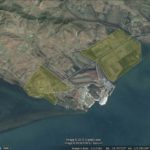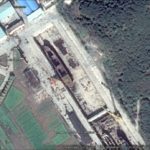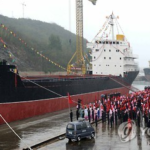UPDATE 1 (2016-5-18): By Benjamin Katzeff Silberstein
A couple of weeks ago, KCNA carried another evaluation of production during the 70-Day Campaign. In the context of claims that the newly launched five-year plan (2016-2020) is the first one in decades, it is worth noting that economic planning as such has never fully ceased to be part and parcel of the official North Korean economy. As communist economies do, North Korea still measures economic success much in terms of mere output. The 70-Day Campaign is one example:
The Korean Central News Agency Thursday released a report on the successful conclusion of the 70-day campaign with a great victory to be specially recorded in the history of the Korean nation under the guidance of Marshal Kim Jong Un.
According to the report, the capabilities for self-defence including the capacity of nuclear attack of Juche Korea have been remarkably bolstered and the campaign plan has been over-fulfilled 44 percent in terms of industrial output value, and industrial production has grown 1.6 times as against the same period last year.
Signal successes have been achieved in the development of Korean-style smaller nuclear warhead, simulated test of atmospheric re-entry of a ballistic missile, test of high-power solid-fuel rocket engine and stage separation, test of high-power engine of inter-continental ballistic missile.
Workers in the four vanguard fields have performed labor feats in the van of day-and-night campaign.
Those in the field of power industry honored their 70-day campaign quotas at 110 percent.
I am not one to draw major conclusions from the order of mentions of areas in reports such as this one, but if the order says anything about priorities, it is worth noting that energy shows up first among other areas than missiles and nukes. Recall that energy has been emphasized by media tied to the North Korean regime.
The Ministry of Coal Industry carried out its coal production plan more than 10 days ahead of schedule and results of capital tunneling and preparatory tunneling have jumped several times as against those in the past.
Those in the steel field and miners hit the goals of production of Juche iron, rolled steel and iron ore.
The field of railway transport carried out the plan for the transport of major freight at 124 percent.
What economic value more transportation carries is unclear…
More than 70 farm machines of over 20 types have been invented and manufactured, typically potato harvester, self-propelled sprayer, combined plowing machine, combined soil governing machine, small multi-purpose farm machine and combined rice thresher.
Those in the fishery field built multi-purpose fishing boats of “Hwanggumhae” series by their own efforts and with indigenous technology in a brief span of time and put them into operation.
The plan for the production of machine tools has been over-fulfilled more than 60 percent and index-specific campaign plans have also been carried out in the machine-building industrial field.
Workers in the Namhung Youth Chemical Complex and Hungnam Fertilizer Complex produced 1.2 times as much fertilizers as before and the February 8 Vinalon Complex significantly increased the production of vinalon and various kinds of other basic chemical goods.
The nationwide cement production plan has been carried out at 141 percent and a boost has also been recorded in the production of varieties of building materials including glass.
Workers of forestry stations and mine pillars production stations honored timber production plan set by the Ministry of Forestry at 137 percent.
Agricultural workers across the country have made full preparations for farming by their devoted efforts.
But note that no numbers are given for farming output, or any agricultural output other than fishing and seaweed.
Officials and workers in the fishery field have over-fulfilled their plan for fishing and seaweed culture more than 10 percent when the results of the Ministry of Fisheries are taken as a whole.
The gross industrial output value in the field of light industry has been over-fulfilled 54 percent and the index-specific performance has shown a marked jump over the period before the campaign.
A number of consumption goods producers have hit their goals for the first half of the year or the yearly ones. Some of them even set a record by fulfilling two-year production quotas.
Those in the field of land and environment protection and workers and other people across the country including youths and students planted hundreds of millions of trees in mountains covering more than 100 000 hectares.
The Paektusan Hero Youth Power Station No. 3 and the Wonsan Army-People Power Station have been successfully completed.
In just one month after breaking the ground for the construction of Ryomyong Street, its builders finished ground excavation for dozens of blocks of apartment houses and are now pushing forward the ground concrete tamping in its final stage.
Baby homes, orphanages, orphans’ primary and secondary schools sprang up across the country and the Mindulle Notebook Factory was built.
New structures have been built one after another. They include Dyke No. 2 of Nunggumdo Tideland, Outdoor Sapling Cultivation Ground of the Central Nursery of the Ministry of Land and Environment Protection and Pyongyang Athletic Apparatus Factory.
Scientists and educators across the country registered three times as many research achievements as against the same period last year to be conducive to the economic development of the country and the betterment of the people’s living standard.
Unprecedented achievements have also been made in the fields of literature, arts, education, public health and sports.
The 70-day campaign of loyalty clearly showed the world how the great Kim Jong Un‘s Korea is advancing toward the eminence of the century.
The full article was published by KCNA on May 6th.
ORIGINAL POST (2016-4-30):
“Industrial establishments over-fulfill production targets as the 70-day campaign comes to an end” (Pyongyang Times: 2016-4-30)
The Hwanghae Iron and Steel Complex, one of the model units in the current 70-day campaign of loyalty, hit its steel and pig iron production targets 101 percent respectively as of April 20.
Smelters of the UHP electric arc furnace have so far reset the peak production record of molten iron per charge several times. They gave full play to the spirit of collectivism of helping and leading one another forward, while introducing advanced working methods to shorten the time of heating and increase the output of molten iron per charge.
The workers of the continuous ingot steel workshop carried out their daily production plan at 102 percent on average, 110 percent at maximum.
Those of the Sunchon Cement Complex drastically raised cement production on the first day of the campaign to renew the daily peak production record for the first time in 20 years. Without resting on their laurels, they worked hard and finally achieved their campaign goals.
The Ministry of Coal Industry carried out its highly-set campaign target ahead of schedule as of April 20 with the coal production plan 101 percent and major, preliminary and boring tunnelling 101.5, 105.5 and 106. 6 percent respectively.
Coal-mining machine factories across the country manufactured and repaired thousands of coal wagons and made over 1 800 wheels more than planned under the uplifted self-development-first banner. A great deal of achievements were also made in the production of coal-mining equipment and their parts.
The Chongchongang Thermal Power Station increased power generation to exceed its campaign plan by 2.2 percent as of April 25. The workers of the station repaired equipment and increased the number of boilers in operation to ensure uninterrupted power generation.
The February 8 Vinalon Complex gave priority to the supply of raw materials and fuel, staggered production and organized management of equipment and technology scrupulously to boost production, thereby surpassing the vinalon production goal by 50 percent.
Workers of the Wonsan Salt Works increased production 2.2 times over the same period of last year by fully storing seawater in reservoirs while introducing an advanced seawater freezing method which suits the conditions on the east coast throughout the winter.Thousands of hectares of farmland have been rezoned in Kaesong and Jangphung County, with over 19 300 patches and paddies and more than 1 260-kilometre-long ridges between paddy and dry fields removed and hundreds of hectares of land brought under cultivation. This paved the way for comprehensive mechanization of farming on all fields and consequent increased cereals production.
Officials and workers of the Sinuiju Textile Mill have produced three times more cotton yarn and fabrics than before the campaign. Amidst the dynamic collective emulation drive between workteams, shifts and workshops, many workers and workteams have carried out the first half year and annual production plans as well as campaign plans and the number is growing.
More than 200 factories and enterprises in Pyongyang have hit their 70-day campaign goals and first half year plans ahead of schedule.
“Nation’s Industrial Production Rises 1.2 Times” (Pyongyang Times: 2016-3-16)
Industrial output grows rapidly thanks to the heightened revolutionary enthusiasm and creative spirit of selfreliance and self development of service personnel and people, who have risen up in the day and night march true to the call of the Central Committee of the Workers’ Party of Korea for launching a 70day campaign of loyalty for the Seventh Party Congress, according to a report of the Korean Central News Agency on March 12.
The nation’s industrial production increased 1.2 times in the first ten days of March over the same period of last year.
The Pukchang and Pyongyang thermal power complexes and other thermal and hydropower stations across the country pressed on with power generation as scheduled, far exceeding the tenday targets set by the Party.
Coal mines in the western areas including Tokchon and Sunchon cut thousands of tons of coal more every day.
The Ministry of Coal Industry overfulfilled the tenday production plan by 13 per cent and the results of major and preliminary tunnelling far surpassed the plan, securing hundreds of reserve coalcutting faces.
The workers of the Hwanghae Iron and Steel Complex doubled the Juche iron output over the same period of last year, and all metallurgical bases conducted a dynamic drive to increase iron and steel production.
Amidst the heated emulation and experiencesharing in iron ore mines in Musan, Unnyul, Thaethan and other areas, the Jaeryong Mine increased daily production over 1.5 times on average, thus taking the lead in the supply of concentrated iron ores to metallurgical factories.
The Ministry of Railways, all the railway bureaus and their branches commanded railway transport scrupulously and gave top priority to concentrated transport without accident to overfulfil the plan for main freight.
The increased production in the vanguard economic sectors injected a new lease of life into the overall major industrial sectors such as machinebuilding, chemical, building materials and mining industries and forestry.
The Taean Heavy Machine Complex completed the production of generating equipment till March 9 in a matter of two months and sent them to the construction site of Paektusan Hero Youth Power Station No. 3 on March 10.
The workers of the large machinebuilding bases in Ragwon and Ryongsong and the Sungni Motor Complex speeded up the processing of products and increased the production of spare parts including various kinds of gears and speed reducers, a great contribution to a 1.5 times rise in the production of thermal power generating equipment of the Ministry of Machine Building Industry.
The workers of the Hungnam Fertilizer Complex hit the Juche fertilizer production target for the first ten days of March.
Cement production is also growing in the Sangwon Cement Complex whose workers and technicians have turned out to break the production record again this year after last year.
Many forestry and prop production stations carried out their first quarterly and yearly timber production quotas.
Farming preparations were brisk on the agricultural front, resulting in a 1.7 and 2.8 times growth in the securing of hukposan and microbial fertilizers and an over 1.3 times increase in the acreage of field carpeted with humus soil.
Officials and fishermen carried out the plans of the Ministry of Fisheries for ten days 121 per cent.
Daily amount of catch increased rapidly and fishing results saw a leap in the fishery stations on the east and west coasts.
Hundreds of workers hit their targets for the first quarter and half of the year in the field of textile industry. Kumkhop, Pomhyanggi and Maebongsan and other popular brands saw a sharp rise in sales.
Many major construction projects progressed apace including those for Paektusan Hero Youth Power Station No. 3, reconstruction of Kim Il Sung Stadium, secondstage reconstruction of the Central Zoo, capacity builup of the Central Tree Nursery of the Ministry of Land and Environment Protection, the central class education hall and Wonsan Army People Power Station.
Many young people volunteered to work in labour consuming fields and hundreds of workers carried out their yearly plans.
“KCNA Reports about Signal Successes in Various Fields in Early March” (KCNA: 2016-3-13)
The Korean Central News Agency Saturday said in a report that the industrial production in the first ten days of March when the 70-day campaign of loyalty is under way grew 1.2 times as compared with the corresponding period of last year.
According to the report, production in the vanguard and basic industrial fields of the national economy including electric power, coal, metal and railway transport sharply rose.
Thermal power plants and hydro-power stations across the country have over-fulfilled their daily quotas.
The production plan of the Ministry of Coal Industry for ten days in March was over-fulfilled 13 percent.
The workers of the Chollima Steel Complex boosted the production of rolled steel 32 percent.
A dynamic drive for increased iron and steel production is under way in metallurgical bases across the country including the Hwanghae Iron and Steel Complex.
The Jaeryong Mine increased daily quotas over 1.5 times on an average, thus taking the lead among the iron ore mines in Musan, Unryul, Thaethan and other areas.
The Ministry of Railways, all the railway bureaus and sub-bureaus over-fulfilled main freight haulage plan.
The increased production in the vanguard sectors of the national economy injected vitality into major industrial fields such as machine-building, chemical, building material and mining industries and forestry.
The custom-built equipment for different fields of the national economy were turned out and the production of nonferrous metal ore, chemical fertilizers, cement, sheet glass, timber, etc. radically increased.
The Taean Heavy Machine Complex completed the production of generating equipment in a matter of two months and sent them to the construction site of the Paektusan Hero Youth Power Station No. 3 on Mar. 10.
The Ministry of Machine Industry increased the production of thermal power generating equipment 1.5 times.
Mines under the Phosphate Fertilizer Industry Management Bureau honored its plan at 150 percent.
The workers of the Hungnam Fertilizer Complex hit the goal for the production of Juche fertilizers.
The workers and technicians of the Sangwon Cement Complex are working hard to surpass the peak production year again this year.
The Sunchon Cement Complex, the Chonnaeri Cement Factory and the Sunghori Cement Factory boosted the production over 10 percent.
Many forestry stations and pit prop production stations also honored their first quarterly and yearly timber production quotas.
The production of homemade fertilizers and their transport, tractor overhauling and maintenance and other farming preparations are nearing completion thanks to the devoted drive of agricultural workers across the country.
The fishery officials and workers over-fulfilled their production plan of the Ministry of Fisheries for ten days 21 percent.
The field of light industry over-fulfilled the production plans for textiles, knitwear and shoes.
In the field of textile industry hundreds of workers honored the half yearly and first quarterly quotas and famous products and goods favored by the people are on the increase.
Many major construction projects are making rapid progress.
A lot of young people volunteer to work in the hard and labor-consuming fields.
Across the country hundreds of workers honored their yearly plans, at least 3,600 people carried out the first half yearly plans and more than 15,400 people hit the first quarterly goal.
A lot of members of the women’s union are giving helping hands to builders in power stations, workers of coal and ore mines. War veterans, honorary party members and pensioners have turned out in the 70-day campaign in South Phyongan Province and other parts of the country to fully demonstrate the noble traits of our society advancing with the might of single-minded unity.
“Rapid Economic Growth Witnessed in DPRK” (KCNA: 2016-4-8)
The DPRK has made a rapid progress in major construction or reconstruction projects and industrial production in recent 40 days after the start of the 70-day campaign.
In particular, Pyongyang, its capital city, showed an increase of twice in the tempo of construction or reconstruction projects and 1.6 times in industrial production.
The Aeguk Vegetable Processing Factory and the Mangyongdae Children’s Camp were rebuilt on a modern basis and the second-stage renovation of the Central Zoo is progressing apace at the final stage.
Besides, 80 percent of total work has been carried out in scores of construction and reconstruction projects, including the Ryuwon Shoes Factory, Pyongyang Cosmetics Factory and the Pyongyang Cornstarch Factory.
Electricity and coal outputs went up at thermal-power and hydro-power stations and coal mines.
The Pyongyang Steel Works and the Pyongyang Cast Iron Pipe Factory fulfilled their production plans 120 percent on an average, 150 percent to the maximum.
An increasing number of units in light industry and foodstuff industry have finished their yearly and half-yearly production quotas.
Such successes are reported from railway, agricultural and other industrial sectors.



